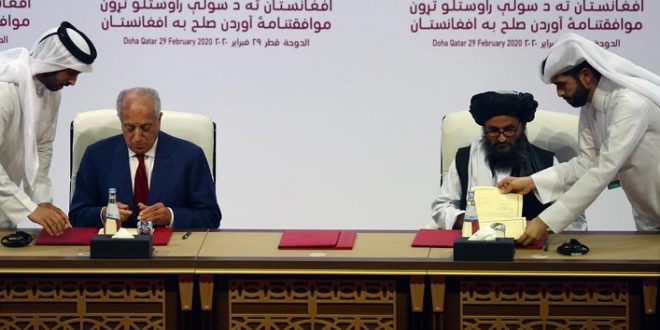U.S. National Security Advisor, Jake Sullivan assured his country’s support to the ongoing peace process, but said the Taliban should participate in “real … not fake” negotiations with the Afghan government
AT News
KABUL: The Joe Biden administration has once again hinted to the review of the Taliban deal that signed last February, to whether the group is committed to the agreement, especially bringing down the level of violence and cutting ties with the al-Qaeda terrorist network.
US President Joe Biden’s National Security Adviser, Jake Sullivan, said that they are “taking a hard look” at how the Taliban is complying with its agreement with the US before deciding how to proceed.
Talking to an online program sponsored by the US Institute of Peace, Mr. Sullivan said that the Taliban should participate in “real … not fake” negotiations with the Afghan government.
“What we’re doing right now, is taking a hard look at the extent to which the Taliban are in fact complying with those three conditions, and in that context, we make decisions about our force posture and our diplomatic strategy going forward,” Sullivan said.
Sullivan discussed the May 1 deadline to withdraw the remaining US forces in Afghanistan under the deal that was signed between the United States and the Taliban in Doha on February 29, 2020.
“That agreement also imposes a set of considerable conditions on the Taliban, and three, in particular, stand out to us,” Sullivan said. “The first is that they, in a bona fide and sustainable way, cut ties with terrorist groups, including al Qaeda. Second is that they meaningfully reduce levels of violence and contribute towards ceasefires. And the third is that they participate in a real way, not a fake way, in negotiations with the Afghan government.”
Sullivan said that the US supports the negotiations between the Afghan government and the Taliban.
“What the previous administration did in terms of setting up and supporting negotiations between the stakeholders in Afghanistan toward a just, durable political settlement to that conflict — that basic frame is something that we very much support,” Sullivan said.
“And we want to support negotiations between the Afghan government and the Taliban and others to get to that just and sustainable outcome — in addition to looking at the US-Taliban agreement and what it means for our forces going forward,” he added.
This comes as the Pentagon recently said “it is very hard” to see a “way forward” with the agreement without the Taliban meeting its commitments.
“Without them meeting their commitments to renounce terrorism and to stop the violent attacks on the Afghan National Security Forces … it is very hard to see a specific way forward for the negotiated settlement, but we’re still committed to that,” Pentagon Spokesman, John Kirby told reporters.
However, Taliban said that they are committed to the agreement signed with the U.S. rather a Taliban spokesman on Friday accused the US of violating its side of the agreement.
Abbas Stanikzai, Chief of the Taliban negotiator, who is in Moscow, said on Friday that if President Ghani ‘resigns’, and let the new government come to power, they are ready to agree on ceasefire and peace.
“Today, if Ashraf Ghani declared to stop the war and says he is resigning and giving sacrifice for the peace, we are ready to negotiate for the new government, something we are doing today,” he said.
According to him, a “New Islamic Government” would be formed under the Doha agreement, and the decision would be up to the Afghans. Mr. Stanikzai also termed Ghani’s government as the main hurdle on the path to peace.
“If Taliban realize that they can prevail [through] violence, they will not let go,” President Ashraf Ghani said during an Aspen Security Institute event on Friday. “And some of their supporters, unfortunately, are equally in that illusionary world.”
President Ghani said he is not an obstacle, but a champion of peace. He strongly rejected the formation of interim-government as unproductive and said, ‘’we must learn from the past mistakes.”
 Afghanistan Times
Afghanistan Times




